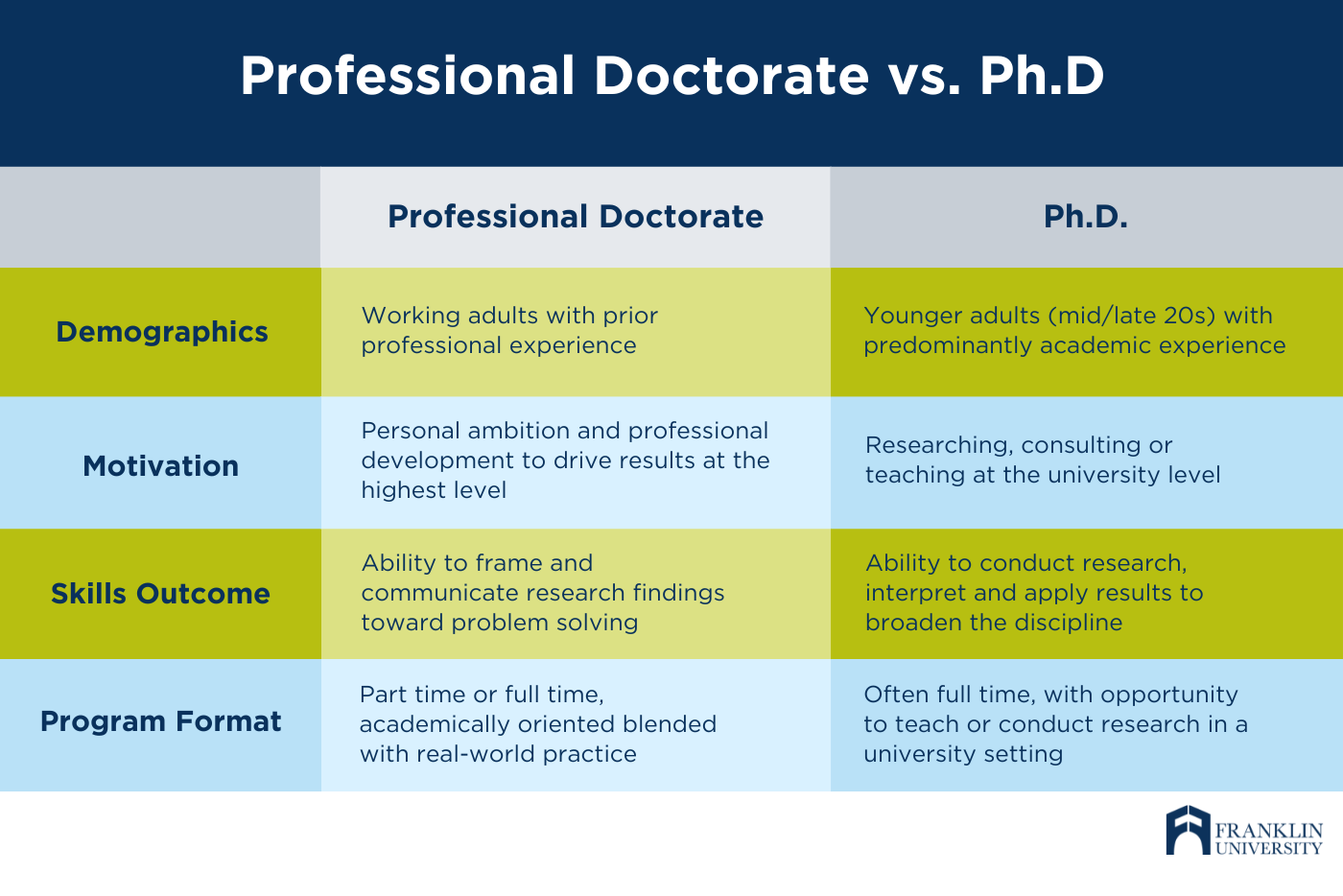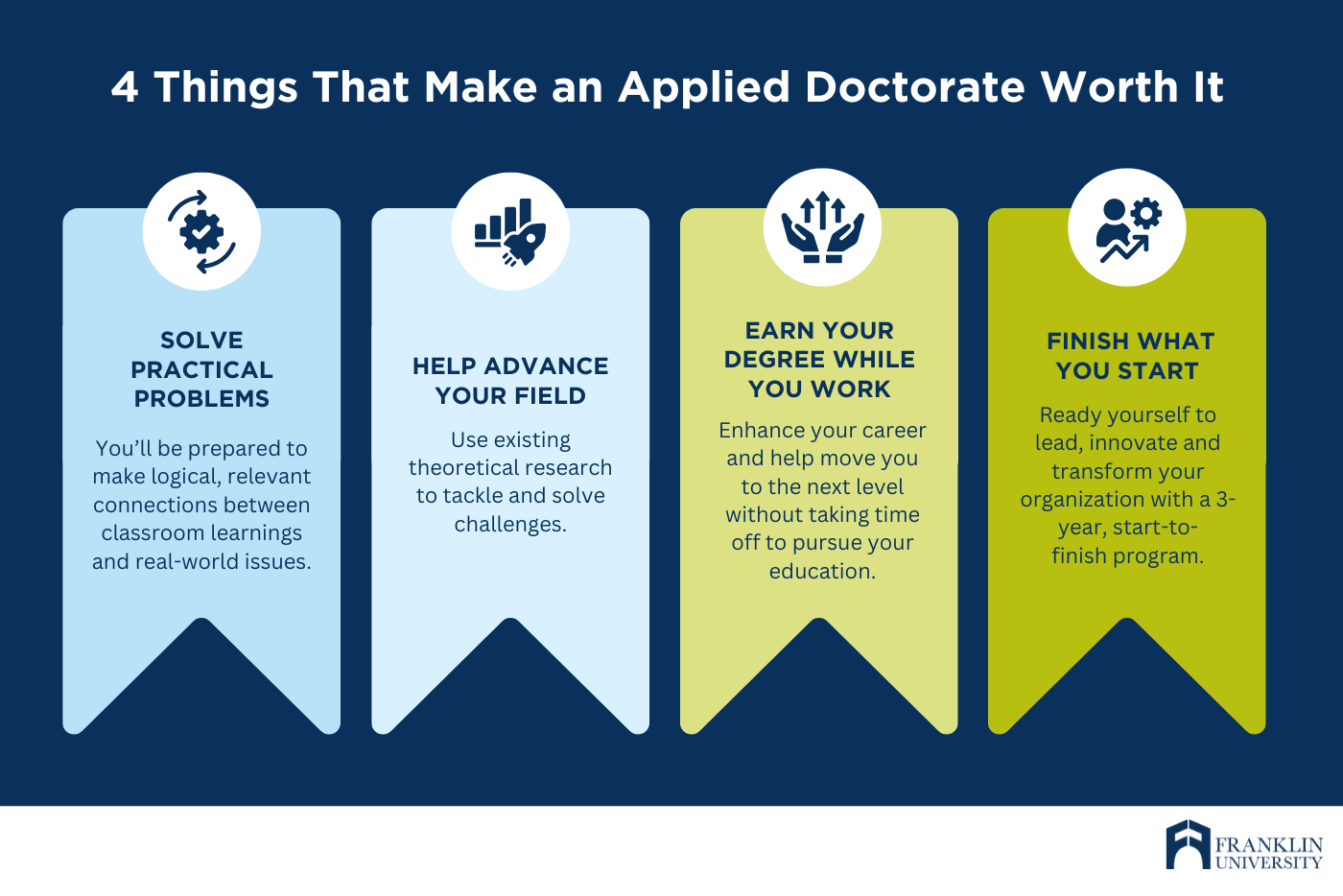Request Information
We're Sorry
There was an unexpected error with the form (your web browser was unable to retrieve some required data from our servers). This kind of error may occur if you have temporarily lost your internet connection. If you're able to verify that your internet connection is stable and the error persists, the Franklin University Help Desk is available to assist you at helpdesk@franklin.edu, 614.947.6682 (local), or 1.866.435.7006 (toll free).
Just a moment while we process your submission.

Professional Doctorate or Ph.D.: What’s the Difference and Which Is Better?
Understanding the differences between a professional doctorate and a Ph.D. is a lot more important than it used to be. That’s because the relatively new professional doctorate is growing in availability, which means it is likely growing in popularity, too.
As professional doctorates come into their own against the ever-popular Ph.D., it becomes a little more challenging to decide which one is better. While both are advanced degrees that can be great for your career, the key to answering the question of which is better starts with understanding what makes them different.
Is a Professional Doctorate the Same as a Ph.D.?
Think of the professional doctorate (also known as an applied doctorate) and the Ph.D. as fraternal twins. They are similar, but not identical.
When it comes to similarities, both degrees are applicable to a variety of career paths, including faculty and adjunct educators and corporate professionals. Of course, some positions, such as teaching at a Tier 1 research institute, require a Ph.D. Other careers, such as analyst and consultant, do well by the applied doctorate degree.
A professional doctorate enables both subject mastery and field application whereas a Ph.D. typically is academically focused.
In short, the difference is application (professional doctorate) vs. academic (Ph.D.). Here’s a more detailed comparison of the two degrees:

Earning a doctorate is challenging and rewarding, but do you know what to really expect? Download this free guide for tips and insights to help you prepare for success.
Applied Doctoral Programs: 4 Facts You Should Know
Ultimately, only you can decide if an applied doctorate or a Ph.D. is better for you, so here are some things to know to help you decide which is right for you.

1. An applied doctorate can help you solve practical problems in your field.
If new research isn’t your thing but evaluating the research of others to solve a problem, uncover an idea or innovate a solution, then an applied doctorate could be ideal.
An applied doctoral program will instruct you in the core technical aspects of quality research. It also will help you further develop and refine your communication skills and technological capabilities. With this type of terminal degree, you’ll be prepared to make logical, relevant connections between classroom learnings and real-world issues.
By combining both research and application, an applied doctorate’s research side can arm you with deeper insight, while the application side can help you make impactful organization-wide decisions to tackle issues, overcome challenges and leverage opportunities.
2. An applied doctorate can help you advance your field through applied research and development.
Both the Ph.D. and the applied doctorate can help you advance your field. Both involve research.
The difference, then, is in who does the research, how the research is presented, and in what way the research is applied.
Primarily, Ph.D.s broaden their field by conducting new research and developing theories. Those who hold a professional doctorate, however, use existing theoretical research to tackle and solve challenges.
3. An applied doctorate offers non-traditional learners more flexibility.
While there are exceptions, many Ph.D. programs require a full-time commitment.
If you’re looking for a professional doctorate to enhance your career and help move you to the next level without taking time off to pursue your education on a full-time basis, then an applied doctoral could offer the flexibility you need to earn it.
Here are a few things to look for as you explore both Ph.D. and applied doctorate programs:
- Online courses vs. on-campus classes
- Residency requirements
- Research focus
- Dissertation structure
- Doctoral student support and learning communities
Remember to choose the program that suits your learning style, as well as your personal and professional situation.
4. An applied doctorate can help you finish what you start.
Let’s face it. It can be tough to finish a doctorate. The life changes accompanying Ph.D. studies can be disruptive and oftentimes overwhelming. Choosing the right research focus can be difficult and laborious. Financial stress, isolation, advisor process and more can be reason enough to abandon the program before completion. And the dissertation process? It can be downright intimidating. In short, earning a Ph.D. can be a long, arduous process.
An applied doctorate on the other hand, especially one that’s designed to be a 3-year, start-to-finish program, can prepare you to lead, innovate, and transform your organization. With a program that offers 360-degree support throughout the program, you’ll have the academic support and resources you need to be accountable to the program and yourself.
Professional Doctorate or Ph.D.: Which Is Right for Me?
Hopefully, you’re now better able to see the differences between a professional doctorate and a Ph.D.
The more you know about the differences–and your interests, goals, and ambitions–the more likely you are to make the best decision for your future. Just remember to prepare yourself mentally, emotionally, socially, financially and academically, and the right doctoral degree program will put you on a clear, straightforward path to earning your degree.





